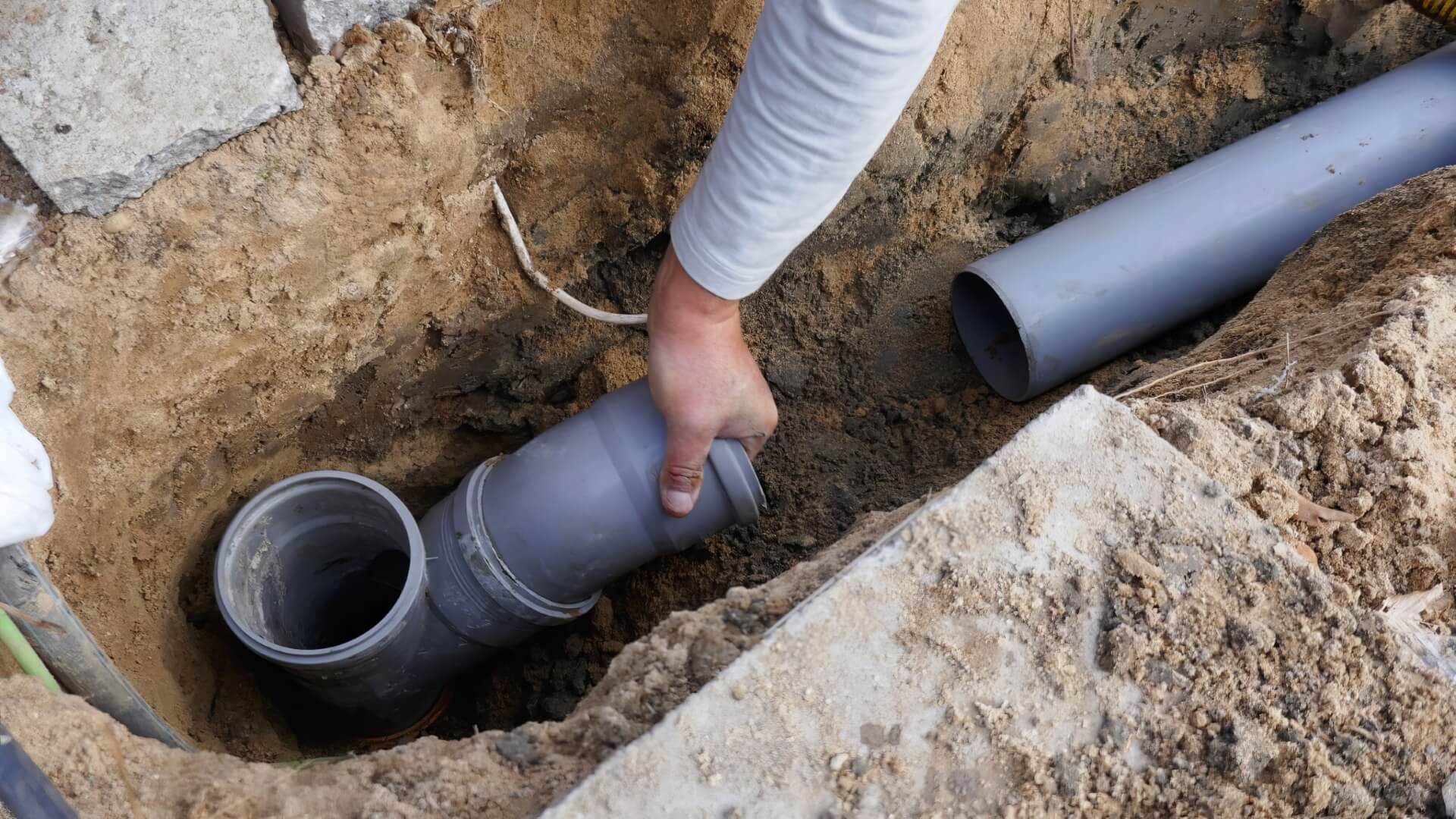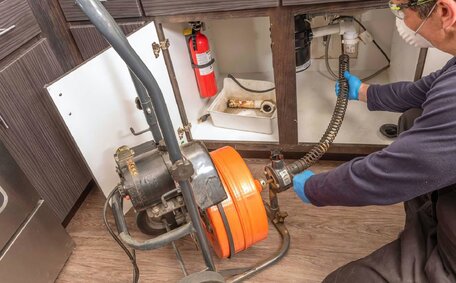Identifying the signs of a serious blockage
Key manifestations indicating a severe plumbing blockage that necessitates immediate attention include:
- Water backing up in your sinks, bathtubs, or toilet
- Gurgling noises emanating from the drains
- Noticeably slow drainage throughout your home
- Foul smell emanating from your stormwater drains
- Water leaks may develop around pipes within your water system
These symptoms are indicative of a serious, pervasive plumbing blockage, which differ from and are more critical than minor clogs. A serious blockage can affect multiple fixtures and risk significant plumbing damage or health hazards if not addressed.
We employ drain camera technology to comprehensively inspect your drain and determine the need for emergency repairs. Catching a blocked drain early is crucial to prevent a burst pipe, water contamination, flooded basements, and other issues.
If you observe any of these signs, contact our plumbing team immediately. We offer emergency plumbing services available 24/7 to swiftly clear your blocked drain, perform repairs, and get your home’s water flowing safely again.
Health and safety risks posed by neglected blockages
Neglected plumbing blockages can lead to serious health risks and safety hazards if left untreated, including:
- Contamination from sewage backup can turn sinks and toilets into health risks, breeding grounds for harmful bacteria.
- Flooding - Rising water levels or backups in your drains indicate clogs or sewer blockages that could lead to overflows and water damage.
- Gas leaks from sewage buildup can introduce toxic and flammable gases such as methane and hydrogen sulphide into your home, posing severe risks.
- Structure damage - Prolonged water pressure from obstructions can lead to a crack, burst in pipes even, which opens the door to leaks, corrosion, and possibly total collapse. When it comes to your pipes, whole sections can take a toll and may need replacement.
Immediate action is needed to resolve a plumbing emergency caused by a serious blockage and ensure household safety. The longer you delay, the worse the contamination, flooding, and damage to your main plumbing infrastructure can become.
Safeguard your household’s health and home; call an emergency plumber for drain cleaning at the first signs of a blockage.
Our team is on-call 24/7 to swiftly manage blockages, sanitise areas, address flooding, and restore safe water flow. Equipped with the necessary gear, we swiftly turn off compromised water sources, ensuring your safety and mitigating health risks.
Knowing when to call a professional
For minor blockages, try DIY remedies like baking soda before calling professional services. Plunging, hot water flushes, enzyme cleaners, or baking soda/vinegar solutions can remove minor clogs.
However, If these remedies fail, it’s crucial to call a professional plumber in the following scenarios:
- Water is backing up into multiple sinks, tubs, showers, or toilets
- You detect gurgling noises coupled with foul odors or experience remarkably slow drainage
- A clogged drain that fails to respond to hot water system remedies
- You suspect tree root invasion or a collapsed main sewer line
- There are signs of water damage from leaks or flooding
- Raw sewage has overflowed inside the home
At Drummoyne Plumbing, we are ready to assist with all your plumbing needs at all hours, available 24 hours day, 7 days a week. We have state-of-the-art drain inspection cameras, hydro jetting equipment, pipe relining techniques, and a skilled drain plumber with the necessary training and protective gear to safely handle sewage situations.
Don’t hesitate to call 1300 349 338 or email [email protected] whenever you suspect a serious clog or plumbing issue. Our team of skilled plumbers can help diagnose causes, clear blockages, perform repairs, prevent contamination or further building damage, and get your home’s water flowing safely again.
Rely on your local plumbing experts; we service Drummoyne and greater Sydney, ensuring emergency after-hours support to secure your property.
Causes of problematic blockages
Grease and Fat Buildup
Grease, oils, and fats can accumulate over time and cause drain blockages. Substances from food scraps washed down sinks adhere to pipe walls. This buildup impedes water flow and can lead to complete blockages.
Flushing Inappropriate Items
Items such as hair, wrappers, baby wipes, hygiene products, and coffee grounds can catch on pipe surfaces and joints, gradually leading to clogs.
Tree Roots
Invasive tree roots, seeking moisture, can cause water sources to become compromised by penetrating cracks and joints in exterior drainage pipes. The roots grow within the drains over time, obstructing water flow and sometimes causing outright collapsed or burst pipes.
Pipe Deterioration
Old and corroded pipes develop cracks, gaps, and protruding joints over decades of use. These areas catch debris passing through your plumbing system and provide places for grease, tree roots, and other substances to accumulate until a clog forms.
Grease and fat buildup
Grease, fat, and oil buildup are primary causes of persistent kitchen sink clogs. As melted fats from food preparation are washed down the sink, they gradually coat the inside of drain pipes throughout your home. Over time, thick layers of grease accumulate and severely restrict water flow, leading to plumbing problems.
Hardened grease nearly seals off pipe interiors, leaving only a small passage for water. Without timely intervention, sink drains can become nearly completely blocked, significantly slowing water drainage or causing backups. Sink overflow can lead to water damage in cabinets, on flooring, or potentially to your walls.
This oily residue also sticks to other passing solids like food scraps. As debris catches on the grease lining drain walls, it collects and compounds clog-causing buildup. Scrape dishes, coffee grounds, and even small amounts of food can snag on the fatty deposits.
Grease and oil buildup in one section of plumbing can also spread slimy film through miles of pipes under a home. As hot water melts the grease, it travels downstream and re-solidifies in cold sections, blocking various drains. Tree roots and pipe joints provide further places for the grease to solidify and accumulate.
To prevent grease-related clogs, scrape and dry dishes before washing. Run hot water for 30-60 seconds after dealing with oil to help flush residual grease out your pipes. Using a drain strainer can also catch scraps before they stick to fatty deposits.
Collect oil and fat in containers to discard with solid wastes rather than pouring down sinks.
Professional drain cleaning is often required to resolve accumulated grease contributing to plumbing issues. Our team uses high-pressure water jetting, mechanical snakes, and chemical cleaners to cut through drains blocked and restore full water flow.
Flushing inappropriate items
Many common household items get flushed down toilets or washed down sinks, eventually causing troublesome clogs. Products like paper towels, cotton tips, condoms, dental floss, sanitary items, and disposable wipes can often do not break down like toilet paper.
Instead, these materials snag inside drains, accumulating with grease, fat, hair, and food scraps. Common culprits like hair soap scum, along with flushable wipes, constrict pipes over time, building up enough debris to severely block water flow and damage your plumbing infrastructure.
Unsuitable items like bath toys, when flushed by small children, not only clog pipes swiftly but can also lead to overflow and stagnant water issues. You should never flush anything beyond human waste and toilet paper, even for reliable macerator or composting toilets, to prevent blockages.
Coffee grounds, egg shells, and excessive food should also not be washed down sinks. These items may pass through piping initially but allow grease residue to stick along drains. Ventilation pipes connecting sinks to main lines are especially problematic areas.
Ensure your household is informed about what is safe to flush, thus keeping your toilet free from inappropriate items. Strategically place bins by sinks to ensure items down drain situations do not occur due to improper disposal habits. Take care not to wash excessive grease or solids down fixtures.
How do you maintain a debris-free drainage system? While best practices can stave off many issues, full prevention of eventual clogs can be challenging. Our professional hydro jetting services can do wonders, blasting through all types of accumulated solids to restore full water flow. We also inspect flushed items to determine any necessary repairs.
Tree roots
Tree roots are all too often the culprits behind a blocked sewer drain, leading to significant blockages and damage. As roots seek out sources of water for the tree’s survival, they can make its way into cracks or gaps in sewer pipes, especially older or deteriorating lines.
Once inside, Tree roots left unchecked will expand, wrangling through your sewer system and causing a formidable sewer backup. In the worst cases, a mass of roots blockage can completely obstruct your sewer line, leading to sewage backups, slow drainage, gurgling noises, foul odours, and flooding.
Tree root intrusions can also break pipes through expansion, often leading to a blocked sewer. Cracks from root growth then provide an entry point for further root penetration and more internal damage. The end result may be collapsed or burst pipes requiring full replacement.
For any blockage your sewer lines have due to root intrusion, they require immediate professional hydro jetting and possibly pipe relining to eliminate the blockage and mend cracks. Severely damaged pipes need excavation and replacement to prevent recurrence. Trees may also need removal or root barriers installed.
Proactive rooter service line inspections can identify intrusions promptly, well before they escalate into emergencies. Our professional plumbers have advanced equipment like drain cameras and high-pressure jetters to clear root-based clogs and repair lines.
Pipe deterioration
Old and corroded pipes are prone to cracking, leaking, and collapsing over time. Gaps, cracks, misaligned pipe joints, and protruding edges can catch debris and turn into significant blockages in plumbing systems. As buildup accumulates in these deteriorated areas, drain blockages form.
Signs of pipe deterioration, including in pipes servicing your bathroom sink, include reduced water pressure and flow, gurgling sounds, foul sewage odours, and leaks. Rust accumulation and abnormal bends or dips in pipes could indicate underlying issues. If severe enough, complete collapses or bursts can occur.
Replacing deteriorated drain lines is often necessary to restore proper function and prevent blockages. We use pipe relining techniques to reinforce old pipes, preventing a drain blocked without full replacement where feasible. CCTV drain inspections are instrumental in accurately pinpointing problem areas to address the issue with precision repairs.
Preventative maintenance can safeguard against issues that can disrupt the integrity of your plumbing. Regular hydro jetting keeps pipes clear of debris and buildup despite age-related defects to prevent further damage. Our plumbers can schedule ongoing maintenance to maximise old pipes’ usable lifespan.
Preventing recurring blockages
There are several effective strategies to help prevent recurring drain blockages and maintain a properly functioning plumbing system:
- Regular cleaning - Scheduling hydro jetting every 6-12 months can remove accumulated hair, soap, grease, and other materials, preventing major obstructions.
- Avoid pouring fats/oils down sinks - Scrape plates and collect oil/grease in containers to trash instead of when using sinks. This prevents fatty buildup inside pipes.
- Use drain strainers - Catch food scraps and hair before they go down the drain and lead to clogs.
- Avoid flushing wipes and sanitary products - Only human waste and toilet paper should be flushed to prevent debris build-up.
- Check for root intrusions - Inspect sewer lines for root overgrowth every year or two using drain cameras. Address intrusions early before major damage occurs.
- Repair pipe defects - Inspect ageing drain lines for cracks, gaps, and leaks that can catch debris. Replace deteriorated sections or relining pipes to prevent blockages.
Implementing these measures will significantly reduce the likelihood of your blocked drains. However, at some point, a professional plumbing service is still needed to keep plumbing systems free-flowing. Our maintenance plans include scheduled hydro jetting services to help avert future blockages.
Comprehending the importance of prevention is precisely why we advocate for proactive measures that spare you from the throes of emergency blockages. Call us immediately if you notice gurgling drains, slow water drainage, foul sewage smells, or any other signs of potential obstructions. Our expert service prevents small issues from becoming major headaches.






